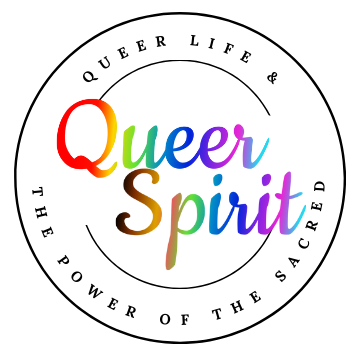Podcast Background
Overview
Queer Spirit, a radio show-turned-podcast series about queer life and the power of the Sacred, originally aired from 2019 to 2022 on two community radio stations in Maine, WMPG at the University of Southern Maine and WERU in Orland, Maine. The program was created and co-hosted by two queer faith leaders, Marvin Ellison and Tamara Torres McGovern, who at the time were both based in Portland. The series was promoted by OUT Cast Radio, a collective of queer activists and artists who over many years had produced a variety of radio programming before finally closing down in 2022.
These podcasts were first recorded as half-hour interviews with faith leaders and spiritual seekers with ties to Maine. Taken together, they offer a sampling of the diverse voices that reside at the intersection of queerness and spirituality at a particular time - the late 2010s - and in a particular place - the state of Maine.
While these interviews were grounded in a specific time and place, they expressed some of the varieties and complexities of queer experiences. As you listen, notice how the interviewee’s queerness is impacted as a result of their identities, social location, and where they were in their life journey when certain cultural shifts took place. How were they impacted by their religious upbringing and whether it was safe to remain a part of their tradition – or not? How were their stories shaped, enriched, and complicated by the ways their race and ethnicity and immigration status intersect with their queer identities? Do they stand within, and even represent, organized religious traditions, or do they reside more comfortably within less formal, more fluid community settings? While each of these interviews offers a glimpse into a life embodied at the intersection of queerness and spirituality, collectively they illuminate some of the contours of queer history and spirituality still very much in the unfolding.
More voices could easily have been included in this sampling. After all, queer people of faith and spiritual vitality are everywhere. We hope this Queer Spirit exhibit will inspire similar projects in other places and times. Interviews like these provide a time capsule of sorts that tell our stories and how we and others find ways to connect body and spirit with integrity and promise, sometimes in struggle and often with joy.
Guiding Assumptions
The Queer Spirit project was grounded in several, key assumptions that helped to shape the show as a whole. These included intermingled assumptions about queerness and religion.
About queerness, Marvin and Tamara assumed that queerness is a fact of life, that queer folks are here to stay, that queerness has profound personal and social meaning, and that queer people have always belonged to and help lead religious communities.
About religion, the project assumed that religion is a fact of life, that religion is here to stay, that religion has profound personal and social meaning, and that religious communities have long been shaped by and enriched by the presence and gifts of queer people.
While it is true that religions can be a source of harm, violation, and oppression, those who participated in the Queer Spirit project held that it is also true that religion can be a resource to empower, inspire, and envision new possibilities. Therefore, Queer Spirit believed that we abandon religion at our peril. To toss religion away, the hosts noted, was to risk loss of spiritual power, the capacity for transcendence, and hope for a radically different world. Addtionally, giving up on religion would hand religion over to our opponents. Instead, the challenge was to rediscover the spiritual heritage of queer saints and troublemakers, present and past. In doing so, Queer Spirit realized that communities and cultures everywhere must continue to make discerning judgments about the kind of spirituality worth having and interrogate every tradition to seek out what is liberating, humanizing, empowering, and justice centered.
Queer Spirit confronted and challenged the fact that for centuries, religious discourse had been a one-sided conversation about queer folks as objects of pity, scorn, and contempt. Queer people have either been silenced and rendered invisible or been disrespected, demeaned, and discarded as sinner, criminals, and crazies.
Yet hope remained. Queer Spirit celebrated the fact that queer folks are increasingly visible and vocal in every religious tradition, claiming their right to speak for themselves as the subjects of their own lives. Queer Spirit insisted on the respect and dignity that should be afforded all persons, and claimed their spiritual power as LBGTQ+ people of moral substance and integrity.
Without doubt, queer folks have distinctive moral wisdom to share about religion, gender and sexuality, cultural change, transcendence, and transformation. Queer Spirit recognized and celebrated that the renewal of religious traditions is intimately bound up with honoring the queer community and learning deeply from diverse queer spiritual witnesses and courageous resistors to oppression in every form. Because, as the LBGTQ Religious Archives Network acknowledges, “history is written from the perspective of those who preserve their records,” Queer Spirit agreed that we must work diligently “to ensure the preservation and accessibility of the voices and experiences of a great diversity of LBGTQ+ religious leaders and groups,” including this collection of Queer Spirit voices.
- Introduction/Landing Page
- Podcast Background
- Queer Radio: OUT Cast Collective
- Queer Spirits
- Marvin Ellison
- Tamara Torres-McGovern
- Carter Heyward
- Jared Saks
- Will Green
- Al Cleveland
- Virginia Marie Rincon
- Skyler Keiter-Massefski
- Samaa Abdurraqib
- Sage Hayes
- Richard Waitzkin
- Rachel Isaacs
- Ophelia Hu Kinney
- Myke Johnson
- Marpheen Chann
- Lynn Bujnak
- Kit Wang
- Jennifer Paty
- Howard Solomon
- Gail Hovey
- Effie McAvoy
- Chris Davis
- Christephor Gilbert
- Christina Cataldo
- Bobbi Keppel
- Thomas Brown
- Amanda Gerken-Nelson
- Alexis Fuller-Wright
- Nicole Manganelli
- From OUT Cast to Outsourced
- DIY: Getting Started
- Teaching Resources





